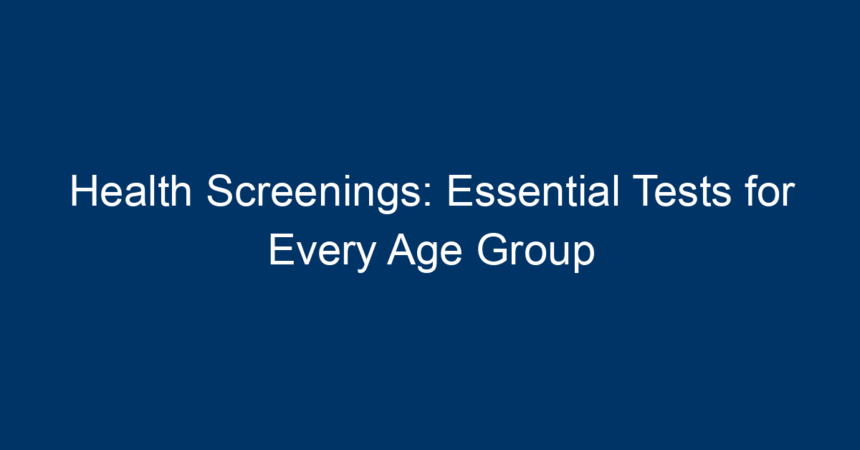In today’s fast-paced world, where health is often overlooked in favor of convenience, health screenings have emerged as a crucial component of maintaining overall wellness. Regular health screenings can detect potential health issues early, allowing for timely interventions that can lead to better health outcomes. But with various tests recommended for different age groups, understanding which health screenings are essential can be confusing. This article aims to clarify the importance of health screenings and outline essential tests for every age group.
What Are Health Screenings?
Health screenings are proactive tests designed to find potential health conditions before symptoms arise. These screenings can include blood tests, imaging tests, physical exams, and questionnaires geared toward identifying risk factors. The primary goal is to catch diseases early—when they are most treatable.
Regular health screenings can:
- Help identify risk factors for chronic diseases
- Aid in early diagnosis of conditions, allowing for timely treatment
- Promote awareness about personal health
Understanding what screenings you need at various stages in life is essential for maintaining your health.
Health Screenings for Young Adults (Ages 18-30)
For young adults, health screenings may take a backseat as often, they feel invincible. However, certain tests are crucial at this stage, particularly for establishing a baseline for future health.
Recommended Screenings:
-
Annual Physical Exam
- A routine check-up to assess overall health, weight, and lifestyle habits.
-
Blood Pressure Screening
- Begin screenings for high blood pressure, which can start even in young adulthood.
-
Cholesterol Check
- A lipid panel is recommended around age 20, especially if there’s a family history of heart disease.
-
Sexually Transmitted Infection (STI) Testing
- Regular screenings for STIs, especially for sexually active individuals, can prevent long-term complications.
- Mental Health Screening
- Due to rising rates of mental health issues among young adults, screenings for depression and anxiety are essential.
Why These Screenings Matter
Keeping an eye on these health markers can prevent future complications. Establishing a relationship with a healthcare provider during this time fosters a proactive approach to health.
Health Screenings for Adults (Ages 31-50)
As adults transition into their 30s and 40s, their bodies undergo various changes that necessitate more frequent health screenings.
Recommended Screenings:
-
Cancer Screenings
- Breast Cancer: Women should begin annual mammograms at age 40.
- Cervical Cancer: Pap smears every three years, starting at age 21, with HPV testing as needed.
- Prostate Cancer: Discuss screening options with healthcare providers starting in their 40s or 50s.
-
Blood Sugar Test
- Regular testing for diabetes, particularly for those with risk factors such as obesity or family history.
-
Colon Cancer Screening
- Begin screenings at age 45, either through colonoscopies or other methods, depending on personal risk factors.
-
Thyroid Function Tests
- Especially for women, thyroid issues often arise during this period.
- Bone Density Test
- Women should assess bone health with a DEXA scan starting at age 50.
Why These Screenings Matter
Regular health screenings for this age group help catch serious ailments before they progress, empowering individuals to make lifestyle adjustments and seek necessary treatments.
Health Screenings for Seniors (51+)
As individuals enter their senior years, age-related health issues are more prevalent, making regular health screenings vital.
Recommended Screenings:
-
Comprehensive Geriatric Assessment
- This holistic approach assesses physiological, psychological, and functional health.
-
Cognitive Function Screening
- Early assessments for conditions like Alzheimer’s and other dementias can facilitate early interventions.
-
Vision and Hearing Tests
- Regular tests to combat age-related decline in vision and hearing.
-
Cardiovascular Health Screening
- Regular cholesterol checks and cardiovascular evaluations become pertinent.
- Vaccinations
- Stay updated on vaccines like the flu shot and pneumococcal vaccine to protect against infections.
Why These Screenings Matter
Seniors benefit immensely from health screenings as they lead to an improved quality of life and help in managing chronic conditions effectively.
Conclusion: Taking Charge of Your Health
Navigating health screenings across different age groups can seem overwhelming, but it’s an essential part of taking charge of your health. Knowing when to schedule screenings and what tests are necessary is the first step toward maintaining a healthier life.
Actionable Insights:
-
Create a Health Screening Calendar: Mark your calendar with the recommended age-specific screenings. Depending on your age, you may be due for tests that help keep your health on track.
-
Communicate with Your Healthcare Provider: Regular discussions with your healthcare provider about your health history and family background can lead to personalized screening strategies.
-
Stay Informed: Read up on changes to screening guidelines as medical recommendations evolve with ongoing research.
- Advocate for Yourself: Don’t hesitate to ask questions or request specific tests during your medical appointments; understanding your body is essential for effective self-care.
Taking preventive steps through regular health screenings is the best way to ensure long-term health. With proper knowledge and proactive habits, you can enhance your well-being at any stage of life. Prioritize your health today, for a healthier tomorrow!




